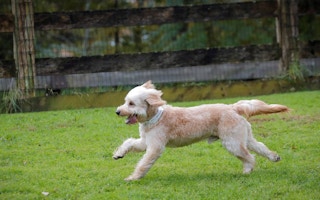Love your dog, but worried about the environmental impact of their meat-heavy diet? Now one British company is offering a solution—feed your pooch insects instead.
It launched a dry dog food on Thursday made from black soldier fly larvae in a bid to tackle the “carbon pawprint” created by pets in the animal-loving nation.
“One of the very best things we can do for the environment is to reduce our meat consumption, but up until now there haven’t been many options for our carnivorous four-legged friends,” said Tom Neish, the brains behind Yora dog food.
There are nearly 9 million dogs in Britain where almost half of adults own a pet, according to the PDSA veterinary charity.
“
One of the very best things we can do for the environment is to reduce our meat consumption, but up until now there haven’t been many options for our carnivorous four-legged friends.
Tom Neish, founder, Yora dog food
Studies suggest pets consume about a fifth of the world’s meat and fish, and a dog’s carbon footprint is more than twice that of a 4x4 car, according to Yora.
Compared to beef farming, it said the grubs need just 2 per cent of the land and 4 per cent of the water to produce each kilogram of protein, which means they generate 96 per cent less greenhouse emissions.
The grubs are grown on vegetable waste at a Dutch farm and the left over matter provides fertiliser for crops.
Neish said a teaspoon of fly eggs could create 100 kg of high-protein larvae in 14 days.
“It’s an amazing nutrient cycle that has been underutilised,” he told the Thomson Reuters Foundation. “Insects have been part of the food cycle since the beginning of time, but we just haven’t been tapping into it.”
Vet Rory Cowlam, who stars in the BBC TV show “The Pets Factor”, predicted other pet food companies would follow suit.
“Insect protein is a really sustainable way of producing protein,” he added. “I think it’s really exciting and I’m sure we’re going to see a huge trend now.”
Yora is named after one of the last uncontacted tribes in the Amazon rainforest, which is threatened by the rising demand for farmland to meet the world’s booming appetite for meat.
But Neish, who is developing a similar food for cats, admitted it could be a challenge to persuade the public to “get over the ick factor”.
“Once you overcome your preconceptions it’s actually quite tasty,” he added. “It has a slightly mushroomy flavour. I’ve tasted quite a few insects in my trials because I don’t think I should feed a dog anything I wouldn’t eat myself.”
This story was published with permission from Thomson Reuters Foundation, the charitable arm of Thomson Reuters, that covers humanitarian news, women’s and LGBT+ rights, human trafficking, property rights, and climate change. Visit http://news.trust.org.










